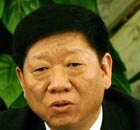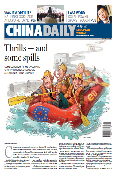Gov't promotion should use traditional criteria
Updated: 2010-11-02 10:56
By Patrick Mattimore (chinadaily.com.cn)
Two weeks ago, China Daily reported that a senior official had announced that an official's psychological health will be assessed in helping to determine whether that official should receive a senior government appointment.
The intent of the evaluation is to assess an official's "psychological qualities" and "moral integrity" apparently as a response to a string of at least eight suicides among government officials this year.
It will be very difficult to implement a fair system to evaluate officials according to those criteria.
One problem with using questions to assess mental fitness is that scientific assessments of psychological health simply are not that accurate. Although the examiners will be selecting from a pool of up to 60,000 questions, sheer volume does not guarantee accuracy.
Unlike giving someone a series of math problems to solve and providing the test-taker with an objective score of her results, mental health test results must always be interpreted and those interpretations are largely subjective. Predicting someone's future behavior from subjective conclusions about present mental health is even more problematic.
Psychologists and psychiatrists can diagnose cases of depression and other mental health issues along continuums. They can make predictions about how someone's mental health might change over time, but those predictions are hardly foolproof. Promotion decisions should be based upon a person's work history, not upon guesswork based upon answers to hypothetical questions.
More important, a person's mental health, unless it is incapacitating, is really not a yardstick which can help pinpoint whether someone is fit to govern. Winston Churchill made frequent references to his own depression and nevertheless is considered one of history's greatest leaders.
One of America's foremost presidents, Abraham Lincoln, suffered from depression. But Lincoln's diagnosis is only the beginning of the story about how Lincoln wrestled with mental demons and how he largely overcame his handicap.
Some would insist that Churchill's and Lincoln's struggles helped both men to become better leaders than they otherwise might have been.
Ironically, if one intent of assessment is to help officials who are showing signs of mental distress get treatment for their ailments, the new evaluations might have the opposite effect. Officials who are being considered for promotion, but fear that their own psychological struggles could hamper their chances, would be less than forthcoming in hoping to present their "best face" to the examiners.
Another problem is that conclusions about officials moral integrity should be based upon their actions, not their pronouncements. Again, a person's past behavior is the best guide as to how that person will react in the future.
Finally, there is the very real possibility that by adding a mental health layer of analysis to official promotion decisions, candidates might attempt to curry favor with examiners by offering them bribes. While such a practice in and of itself should be enough to disqualify candidates from promotional consideration, the fact is that there are likely at least a few unscrupulous examiners who would be swayed by a bribe.
The idea of selecting mentally healthy individuals for senior government positions is on its face a good one. But unless a person's psychological health and moral integrity can first be scientifically established and then linked to qualities that insure good governance, it's probably best to continue to rely on traditional avenues of promotion for government officials.
Patrick Mattimore is a fellow at the American-based Institute for Analytic Journalism, former psychology teacher, and an adjunct professor at Tsinghua/Temple Law School LLM Program in Beijing.
Paper's Digest

Chinese jet takes on Big 2
First large commercial plane set to ride on demand for aircraft as economy grows.
Super-CPU only for domestic eyes
Specials

Gaining ground
Doing business in china for westerners has come a long way, Peter batey says.

Safeguarding environment a priority
China continues to face mounting pressure to curb environmental degradation, despite progress in reducing pollution over the last five years, the environmental protection minister warned.

Employment to remain a continuing challenge
China's top labor official said the country will face a tough employment situation in the next five years.
